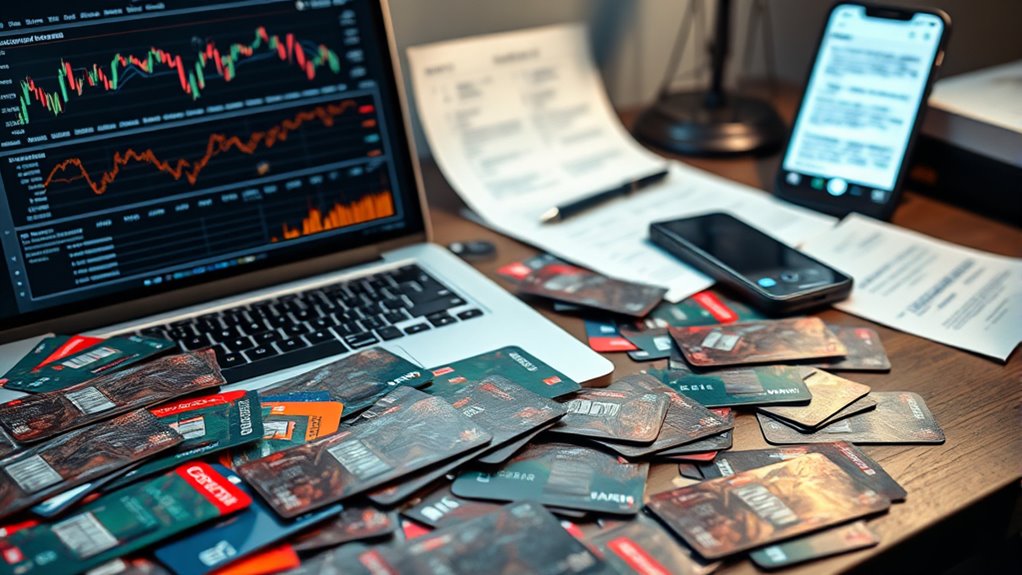The gift-card resale market offers exciting rewards like discounts of 10-30% and access to unavailable or sold-out cards, saving you money and expanding your options. But it also comes with risks such as counterfeit cards, scams, and hidden fees. To benefit safely, you need to identify reputable platforms and verify sellers. To discover how to navigate these risks and maximize your rewards, explore further insights into securing authentic, protected transactions.
Key Takeaways
- Resale market offers discounts of 10-30%, providing savings but also risks of counterfeit or invalid cards.
- Trustworthy platforms and seller verification are essential to avoid fraud and ensure secure transactions.
- Retailers benefit from increased sales but risk brand damage if resale activities lack transparency.
- Legal and ethical compliance, including respecting retailer policies, is vital to sustain market integrity.
- Advances in security and transparency are shaping the future growth of the gift-card resale industry.
Understanding How the Gift-Card Resale Market Works

The gift-card resale market operates as a marketplace where consumers buy and sell unused or partially used gift cards. You can find platforms dedicated to this purpose, where sellers list their cards with details about the balance and merchant. Buyers browse listings, compare prices, and purchase cards at a discount from their original value. The process usually involves a secure transaction system that protects both parties, which often includes secure payment methods to ensure safety. Sellers might use these platforms to recoup some money from unwanted gifts, while buyers look for deals or specific brands at lower prices. Once the transaction is completed, the buyer receives a digital or physical card, which they can redeem at the retailer. Understanding this process helps you navigate the market confidently and avoid potential scams or pitfalls. Additionally, being aware of the security features of the platforms can help protect your transactions and personal information. Recognizing the importance of trustworthy platforms can further reduce risks associated with the resale process. Moreover, knowing about regulatory oversight can help consumers stay informed about the legitimacy of the marketplace. Being mindful of potential scams is also crucial to ensure a safe and successful transaction.
Advantages of Buying Resold Gift Cards

Buying resold gift cards offers several advantages that can help you save money and access deals you might not find elsewhere. First, resold cards often come at a discount, sometimes 10% to 30% below face value, allowing you to stretch your budget further. This can be especially valuable during holiday seasons or special occasions. Additionally, buying resale gives you access to cards for stores or online platforms that may be sold out or unavailable through traditional channels. Resellers also provide flexibility, with options to purchase cards instantly online, saving you time. Finally, some resellers offer verified, secure transactions, giving you peace of mind. Overall, buying resold gift cards can be a smart way to maximize value and enjoy discounts that enhance your shopping experience. Raw food diets can also be a healthy alternative for certain consumers, emphasizing unprocessed, fresh options.
Common Risks and Pitfalls in Resale Transactions

While reselling gift cards can offer great savings, it also comes with inherent risks that you need to watch out for. One common pitfall is encountering counterfeit or already-used cards, which can leave you empty-handed and out of money. Always verify the card’s balance before completing a transaction. Another risk is seller scams, where buyers might send fake payment or disappear after the sale. Additionally, platform restrictions or seller policies can complicate refunds or disputes, leaving you vulnerable if something goes wrong. Using untrustworthy sources increases your chances of fraud. Also, be aware that some cards may have expiration dates or activation fees that reduce their value. Being cautious and doing your homework helps you avoid these pitfalls and protect your investment. For example, understanding the Eye Patch Benefits can help you recognize genuine products and avoid counterfeit items. Remember, understanding the Floating on Water concept can help you stay calm and make better decisions when faced with unexpected issues in resale transactions. Conducting thorough research on the Dog Names can ensure you are dealing with reputable sources that prioritize safety and authenticity. Moreover, recognizing the importance of Emotional Support can aid in managing the stress that may accompany challenging transactions.
Identifying Reputable Resale Platforms and Sellers

Since not all resale platforms and sellers are equally trustworthy, conducting thorough research beforehand is vital before making a purchase. Look for platforms with clear policies, positive reviews, and secure payment options. Check if the seller has a verified reputation, transparent ratings, and a history of successful transactions. Beware of sites that lack contact information or have limited seller feedback. To identify reputable sources, consider these tips:
- Read independent customer reviews and testimonials
- Verify the platform’s security measures and refund policies
- Ensure the seller has a high rating and consistent positive feedback
- Use trusted, well-known marketplaces rather than unknown sites
- Remember that online platforms often utilize expert voice actors and immersive storytelling techniques, so choosing reputable sources can help you avoid scams and increases your chances of a safe, legitimate transaction. Recognizing narcissistic manipulation tactics in online interactions can also help you stay vigilant and protected during your purchase process. Additionally, understanding the affiliate disclosure policies of a platform can help you assess its transparency and trustworthiness. Incorporating due diligence as part of your research process can further safeguard your purchases and ensure you deal with credible sellers. Furthermore, verifying the resale market pricing can help you avoid overpaying or falling for price inflation scams.
Tips for Securing a Safe and Authentic Purchase

To guarantee your purchase is safe and genuine, start by verifying the seller’s credentials and reputation. Always opt for secure payment methods to protect your financial information. Taking these steps helps you avoid scams and guarantees a smooth transaction.
Verify Seller Credentials
Verifying the seller’s credentials is essential to guarantee a safe and authentic gift card purchase. You want to ensure the seller is trustworthy before exchanging money. Start by checking for reviews or ratings—positive feedback indicates reliability. Look for seller profiles that have a verified badge or established reputation. Confirm their contact details and ask for proof of previous transactions if possible. Be cautious of sellers with limited or suspicious profiles. Additionally, understanding brand reputation and how it relates to the authenticity of the seller can help you recognize the importance of transparency and honesty from sellers in online markets. Recognizing the significance of sleep and mental health can also influence your overall sense of well-being, making it even more crucial to avoid scams that could cause additional stress. Developing data-driven strategies for assessing seller credibility can further protect you from potential fraud. Taking these steps helps you avoid scams and counterfeit cards. Trustworthy credentials are your best safeguard against fraudulent or invalid gift cards.
Use Secure Payment Methods
Using secure payment methods is essential to protect yourself from scams and guarantee your purchase is legitimate. Always choose trusted platforms that offer buyer protection and avoid direct transfers or wire payments. Credit cards and reputable escrow services provide added security, giving you recourse if something goes wrong. Incorporating organized storage solutions can help keep transaction records and receipts easily accessible for future reference. Additionally, keeping digital copies of your transaction records can further safeguard your purchases and facilitate dispute resolution.
The Impact of Resale Market on Consumers and Retailers

The resale market influences both your purchasing options and retailers’ strategies through price fluctuations and partnerships. As prices can vary unexpectedly, your trust in gift cards may be affected, making you cautious about where and how you buy. Retailers face challenges maintaining consumer confidence while managing new resale dynamics that impact their brand integrity.
Price Fluctuation Effects
Price fluctuations in the resale market can substantially impact both consumers and retailers. When resale values rise, you might find that gift cards become more expensive, limiting your options or making gift cards less attractive. Conversely, if prices drop, you could get better deals or see decreased trust in card value. Fluctuations also affect retailers who may face:
- Reduced sales if consumers wait for prices to drop
- Increased demand during price dips
- Potential loss of revenue from undervalued cards
- Market volatility creating uncertainty for planning
These shifts can influence your purchasing decisions, as well as retailer strategies, making it essential to stay aware of current market trends. Price swings can either benefit or hinder your ability to save or spend effectively on gift cards.
Retailer Partnerships Impact
Retailer partnerships with resale platforms considerably shape how consumers access and value gift cards. When retailers collaborate with resale marketplaces, it can expand the reach of their gift cards, making them more accessible to a broader audience. These partnerships often lead to increased sales volume and help clear excess inventory. However, they also influence brand perception; some may see resale activity as a sign of demand, while others worry about potential misuse or devaluation. Retailers gain insights into consumer preferences through resale trends, allowing for better marketing strategies. On the flip side, resale partnerships can complicate loyalty programs and affect pricing stability. Overall, such collaborations impact consumer choices and retailer brand integrity, balancing potential growth with the need for careful management.
Consumer Trust Challenges
Partnerships between retailers and resale platforms can complicate consumer trust, raising questions about the authenticity and safety of purchased gift cards. When resale sites operate alongside official channels, you might worry about fraud, invalid codes, or hidden fees. This uncertainty can deter you from buying resale gift cards altogether. To protect yourself, consider these risks:
- Buying from unverified sellers increases fraud chances
- Gift cards may be previously redeemed or stolen
- Resale platforms might lack clear refund policies
- Fake or expired cards could cause financial loss
These challenges can erode confidence in the resale market, making you hesitant to participate. Retailers and resale platforms need transparent practices to build and maintain your trust, ensuring that your purchases are safe and legitimate.
Legal and Ethical Considerations in Gift-Card Reselling

Guiding the legal and ethical landscape of gift-card reselling is essential to avoid potential pitfalls. You must understand the rules that govern transactions to stay compliant and maintain trust. Resellers should verify card legitimacy and avoid stolen or compromised cards. Ethical practices include transparency about card sources and fair pricing. The following table highlights key considerations:
| Legal Focus | Ethical Focus |
|---|---|
| Comply with state and federal laws | Be honest with customers |
| Avoid fraud and theft | Price fairly and transparently |
| Respect retailer policies | Protect customer data |
| Understand resale restrictions | Maintain reputation |
Staying informed and ethical ensures your resale business remains sustainable and reputable.
Future Trends and Opportunities in the Resale Industry

The gift-card resale industry is poised for significant growth as technology advances and consumer preferences shift toward online and mobile transactions. You’ll see more platforms leveraging artificial intelligence to detect fraud and improve user experiences. Mobile wallets and digital gift cards will become dominant, making reselling easier and more seamless. Expect increased integration with e-commerce ecosystems, allowing for real-time pricing and instant transactions. Additionally, the industry will likely see growth through international markets, expanding opportunities for resellers worldwide.
The gift-card resale industry is set for growth with AI fraud detection, seamless digital transactions, and expanding international markets.
- Enhanced security measures to prevent scams
- Greater transparency with real-time pricing tools
- Expansion into emerging markets
- Partnerships with major retailers and platforms
Frequently Asked Questions
How Do Resale Prices Compare to Original Gift Card Values?
When you compare resale prices to original gift card values, you’ll often find they sell for less. Resale prices typically range from 70% to 90% of the card’s face value, depending on demand and the platform. You might get a slightly lower amount than the card’s worth, but reselling can still be worthwhile if you want quick cash or no longer need the card. Just be aware of the discounts involved.
What Are Common Signs of a Counterfeit or Invalid Gift Card?
When checking for counterfeit or invalid gift cards, look for obvious signs like misspelled words, faded or damaged cards, and unusual packaging. Always verify the card’s security code and ask for a receipt or proof of purchase. If the card’s balance can’t be checked online or at the store, it’s a red flag. Trust your instincts—if something feels off, avoid using or purchasing the card.
Are There Specific Categories of Gift Cards More Prone to Fraud?
Imagine holding a gift card, but something feels off—could it be more vulnerable? Certain categories, like popular retail stores, gaming cards, and digital codes, attract more fraud because of high demand. Thieves target these more often, making them riskier to buy or sell. Stay vigilant—always check for tampering, verify authenticity, and buy from trusted sources to avoid falling victim to scams.
How Do Return Policies Differ for Resold Gift Cards?
When it comes to return policies for resold gift cards, you’ll find they often vary by seller. Some may offer full refunds within a certain window, while others might have strict no-return policies due to fraud concerns. It’s essential that you read the terms carefully before purchasing. Being aware of these policies helps you avoid surprises and ensures you understand your options if the card doesn’t work or isn’t as expected.
What Impact Does Resale Have on Gift Card Issuer Revenue?
Reselling gift cards can reduce the revenue for issuers because it often involves discounted sales outside official channels. When you buy resold cards, issuers miss out on full-price transactions, which can impact their overall income. Additionally, frequent reselling might lead to increased fraud risks, further affecting issuer revenue and trust. As a result, while reselling offers savings for consumers like you, it can challenge the financial health of the issuing companies.
Conclusion
Steering the gift-card resale market can feel like stepping into uncharted territory, much like explorers of old. While there are rewards to be found, such as savings and convenience, you must also beware of pitfalls and scams. Stay vigilant, choose reputable platforms, and trust your instincts—like a modern-day Columbus charting new waters. With careful steps, you can enjoy the benefits while avoiding the treacherous reefs that lurk beneath the surface.









